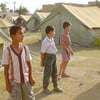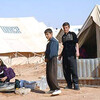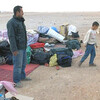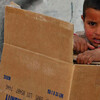
Palestinian refugees at Iraq-Jordan border receiving assistance
26 March 2006
Palestinian refugees fleeing Iraq, who were refused entry into Jordan last week, are now receiving assistance from UN refugee agency, UNHCR, and the Iraqi Red Crescent Society. On Sunday, Ehab Taym, one of 88 Palestinian refugees who recently fled Baghdad, speaking from the Iraqi side of the border, said that the IRCS and UNHCR-Amman had sent blankets, tents, food and water. After having been moved from the “No Man’s Land” border area to the Iraqi side of the frontier, Taym said they were now housed in 20 tents provided by the aid agencies. They now await their fate. About a week’s worth of humanitarian assistance in the form of food, mattresses and blankets was provided to the refugees on Thursday. Read more about Palestinian refugees at Iraq-Jordan border receiving assistance








